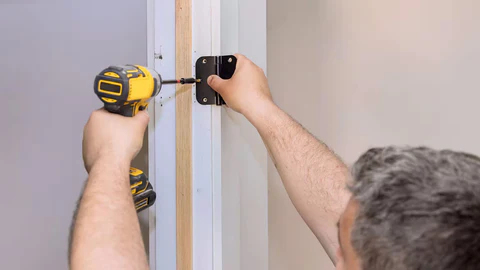Eco-Friendly Lock Solutions: Sustainable Choices for Homeowners 🌍🔒
As homeowners embrace eco-conscious living, sustainability extends beyond solar panels and energy-efficient appliances—it also applies to the hardware we choose. Eco-friendly lock solutions minimize environmental impact by utilizing recycled materials, non-toxic finishes, and durable designs that stand the test of time. In this post, we’ll explore what defines a green lock, highlight top sustainable brands, discuss additional benefits like durability, explain how to recycle or repurpose old locks, compare costs, and share Good Deal Locksmith’s green initiatives in Orlando.
What Makes a Lock Eco-Friendly? 🌱
An eco-friendly lock prioritizes environmental responsibility at every stage—materials sourcing, manufacturing, packaging, and end-of-life disposal. Key attributes include:
-
Recycled or Reclaimed Materials
-
Locks constructed from recycled steel, aluminum, or brass reduce demand for virgin metal mining.
-
Some manufacturers use reclaimed wood or bamboo for handles and trim components, diverting waste from landfills.
-
-
Non-Toxic, Low-VOC Finishes
-
Traditional lock finishes often contain volatile organic compounds (VOCs) that off-gas harmful chemicals.
-
Eco-friendly finishes use water-based or powder-coat lacquers free of lead, chromium, and other hazardous heavy metals.
-
-
Energy-Efficient Manufacturing
-
Green lockmakers employ renewable energy (solar, wind) in their factories or use energy-saving processes like cold forging to reduce carbon emissions.
-
-
Longevity and Recyclability
-
Durable lock mechanisms extend product life—fewer replacements mean less waste over time.
-
At end of life, components are designed for easy disassembly so metals and plastics can be recycled or repurposed.
-
-
Minimal Packaging and Responsible Shipping
-
Eco-focused brands use recycled cardboard packaging or biodegradable wrapping.
-
Some lockmakers offset shipping carbon by purchasing renewable energy credits or employing carbon-neutral couriers.
-
Key Takeaway: A truly sustainable lock combines recycled materials, non-toxic finishes, energy-efficient production, and a design that facilitates recycling—minimizing environmental impact from “cradle to grave.”
Top Sustainable Lock Brands to Consider 🏷️
Several lock manufacturers lead the way in sustainable practices. Here are some top eco-friendly lock brands, each offering green credentials and reliable performance:
-
Brand A: GreenGuard Hardware
-
Utilizes 90% recycled stainless steel for cylinders and internal components.
-
Powder-coated finishes in low-VOC colors.
-
Packaging made from recycled cardboard—no plastic inserts.
-
-
Brand B: EcoLock Systems
-
Produces locks with biodegradable polymer housings for non-structural parts.
-
Implements a take-back program: customers return old locks for refurbishing or metal reclamation.
-
Factory powered entirely by renewable energy (solar arrays on-site).
-
-
Brand C: SustainSecure
-
Combines reclaimed brass hardware with bamboo trim options.
-
Manufactures packaging with soy-based inks on recycled paperboard.
-
Offers modular designs—if one component fails, the rest of the lock can be retained and only the faulty piece replaced.
-
-
Brand D: BioBolt Innovations
-
Pioneers a proprietary metal alloy made from 60% post-consumer scrap.
-
Implements local manufacturing facilities to reduce shipping distances and carbon emissions.
-
Employs eco-friendly powder coating that requires no solvent-based reducers.
-
-
Brand E: EarthSafe Locks
-
Creates locks with a zinc-aluminum finish free from hexavalent chromium.
-
Offers a lifetime warranty—encouraging repairs rather than replacements.
-
Works with certified green packaging suppliers, ensuring all materials are FSC-certified and fully recyclable.
-
Bullet List:
-
GreenGuard Hardware (recycled stainless steel, powder-coat)
-
EcoLock Systems (biodegradable polymer, take-back program)
-
SustainSecure (reclaimed brass, bamboo trim, modular design)
-
BioBolt Innovations (post-consumer scrap alloy, local manufacturing)
-
EarthSafe Locks (zinc-aluminum finish, lifetime warranty, FSC packaging)
Benefits Beyond the Environment: Durability and Longevity 🛠️
Choosing an eco-friendly lock offers more than reducing your carbon footprint. These sustainable options often boast superior durability and longevity, saving you money and hassle over time:
-
Corrosion Resistance
-
Recycled stainless steel and high-quality powder-coatings resist rust and corrosion, particularly in humid climates like Orlando. A lock that resists moisture requires fewer replacements.
-
-
Reduced Mechanical Wear
-
Premium eco-friendly alloys and precision machining lead to smoother operation. Components made from forged recycled steel or brass experience less friction and wear, extending lock life by years.
-
-
Modular Repairability
-
Many green locks feature modular designs—if a latch or cylinder fails, you can replace only that part instead of the entire lockset. This reduces waste and lowers long-term maintenance costs.
-
-
Warranty Incentives
-
Eco-conscious brands often provide extended warranties (5–10 years or lifetime) since they trust their materials and manufacturing processes. Fewer warranty claims mean fewer parts discarded prematurely.
-
-
Premium Aesthetics
-
Reclaimed brass or bamboo accents offer unique, high-end looks that weather gracefully over time. Rather than cheap plating that peels, these materials develop a natural patina that can be polished or left as-is for character.
-
Insight: While eco-friendly locks may carry a slightly higher upfront cost, their extended service life and minimal maintenance often yield a lower total cost of ownership compared to standard, lower-grade locksets.
Recycling or Repurposing Old Locks 🔄
Instead of tossing worn-out locks into the trash, you can extend their utility or ensure their materials re-enter the recycling stream. Here’s a step-by-step guide:
-
Remove the Lock Carefully
-
Use a screwdriver or drill to extract the lockset from the door. Keep screws and small parts together in a labeled bag to simplify future reassembly or donation.
-
-
Disassemble into Components
-
Separate the cylinder, latch, strike plate, handle/knob, and any electronic modules. Most eco-friendly brands design for easy disassembly—consult the manufacturer’s manual if needed.
-
-
Sort Materials by Type
-
Place metal parts (steel, brass, aluminum) into your household recycling bin if accepted. For copper or mixed-metal pieces, check with local scrap metal recyclers.
-
Recycle plastic or polymer parts if labeled with a recycling code accepted by your municipality. If not recyclable, consider repurposing (see step 5).
-
-
Recycle Electronic Components Responsibly
-
Electronic modules—keypads, circuit boards, sensors—contain metals and plastics that require e-waste recycling. Locate a certified e-waste drop-off facility in Orlando (e.g., Orange County’s Electronics Recycling program).
-
-
Repurpose Usable Hardware
-
If the lock is still functional or can be easily rekeyed, consider donating to local charities or Habitat for Humanity ReStore. Volunteers often refurbish and use these locks in low-income housing projects.
-
Decorative handles or knobs in good aesthetic shape can be repurposed for DIY projects—such as drawer pulls or towel hooks—extending their life in a creative way.
-
-
Document for Resale or Trade
-
If the lock is vintage or high-quality, it may have resale value. List it on local marketplaces (e.g., Facebook Marketplace, Nextdoor). A well-maintained used lock offsets production of new hardware.
-
Local Tip: Good Deal Locksmith partners with select recycling centers—ask us for a list of recommended drop-off points. We also accept old lock donations for our refurbishment program, ensuring your hardware stays out of landfills.
Cost Comparison: Eco Locks vs. Standard Locks 💲
Investing in eco-friendly locks often prompts questions about affordability. Below is a comparison of average price ranges and long-term costs:
| Lock Type | Upfront Cost | Expected Lifespan | Annual Maintenance Cost | End-of-Life Cost |
|---|---|---|---|---|
| Standard Grade 2 Deadbolt | $40 – $60 | 3–5 years (residential) | $10 (lubrication) | $5 (metal recycling) |
| Standard Electronic Lock | $150 – $200 | 5–7 years | $20 (battery changes) | $10 (e-waste recycling) |
| Eco-Friendly Mechanical Lock | $75 – $100 | 10–15 years | $5 (annual lubrication) | $0 – $5 (recyclable materials) |
| Eco-Friendly Electronic Lock | $180 – $250 | 8–10 years | $15 (batteries/updates) | $5 – $10 (recycling) |
-
Upfront Cost:
-
Eco-friendly mechanical deadbolts cost approximately $75–$100, versus $40–$60 for standard Grade 2 models.
-
Eco-friendly electronic or smart locks run $180–$250, slightly higher than standard $150–$200 options.
-
-
Expected Lifespan:
-
Standard mechanical locks in residential use often wear out in 3–5 years. Eco-friendly alternatives—using corrosion-resistant alloys—last 10–15 years.
-
Smart locks also benefit from modular components, extending lifespan to 8–10 years, compared to 5–7 years for generic models.
-
-
Annual Maintenance:
-
Eco locks require minimal care (occasional lubrication at $5/year), while standard locks still need the same lubrication but may corrode faster, requiring part replacements.
-
Electronic eco-locks see lower battery costs due to efficient power management, averaging $15/year, compared to $20/year for standard smart locks.
-
-
End-of-Life Disposal:
-
With most eco locks, nearly all materials are 100% recyclable, often yielding small scrap returns or zero disposal fees. Standard locks may incur minor e-waste recycling fees.
-
Long-Term Value: The slightly higher upfront cost of eco-friendly locks pays dividends through lower maintenance, fewer replacements, and minimal disposal fees—yielding a lower total cost of ownership over a decade.
Good Deal Locksmith’s Green Initiatives in Orlando 🌿🔧
At Good Deal Locksmith, we’re committed to sustainability—both in our hardware recommendations and company practices throughout the [Service Area]. Our initiatives include:
-
Eco-Conscious Product Lines
-
We stock and recommend GreenGuard, EcoLock, and SustainSecure brands—ensuring homeowners have access to the latest eco-friendly lock technology without scouring the internet.
-
-
Lock Recycling & Donation Programs
-
Our workshop hosts a monthly “Lock Reclamation Day”, where customers drop off old locksets for free. We disassemble salvageable units, refurbish functioning components for donation, and recycle remaining metals through certified local recyclers.
-
-
Carbon-Neutral Dispatch Fleet
-
Our mobile service vans run on biodiesel blends, reducing carbon emissions by up to 40%. We plan to transition to fully electric vans by Q4 2025, further cutting emissions and setting a local example.
-
-
Digital Documentation & Invoicing
-
We’ve eliminated paper invoices. All estimates, receipts, and maintenance logs are delivered electronically, saving an estimated 10,000 sheets of paper annually.
-
-
Green Training & Community Outreach
-
Our technicians receive quarterly training on eco-friendly hardware, sustainable installation methods (e.g., neater, less-wasteful drilling), and how to advise homeowners on long-term energy savings through secure, draft-blocking lock installations.
-
We host free “Green Home Security” workshops at local community centers—teaching families how to choose sustainable locks, properly maintain them, and recycle old hardware.
-
-
Partnerships with Local Recyclers
-
We’ve partnered with Orange County Electronic Waste Services and Sunshine Metals to guarantee that all old lock metals and electronic modules are recycled responsibly—no landfill diversion.
-
Local Impact: By integrating these green initiatives, Good Deal Locksmith not only helps customers secure their homes but also ensures Orlando’s environment remains protected for future generations.
Conclusion & Call-to-Action 📞🌳
Choosing eco-friendly lock solutions is a simple yet impactful step toward a greener home. By prioritizing recycled materials, non-toxic finishes, durable designs, and responsible disposal, homeowners can reduce their environmental footprint while enjoying superior security and longevity. Although eco-friendly locks carry a modest premium, the long-term savings—in maintenance, replacements, and disposal—make them a wise investment.
At Good Deal Locksmith, we’re dedicated to helping [Service Area] residents adopt sustainable hardware through our curated product lines, recycling programs, and carbon-conscious practices. Ready to make the green switch?
🔑 Request a Green Consultation today by calling (407) 726-8486 or visiting our website. Let our experts assess your needs, recommend the best eco-friendly lock for your home, and ensure a seamless, sustainable installation. Your next secure, environmentally responsible lock awaits!

